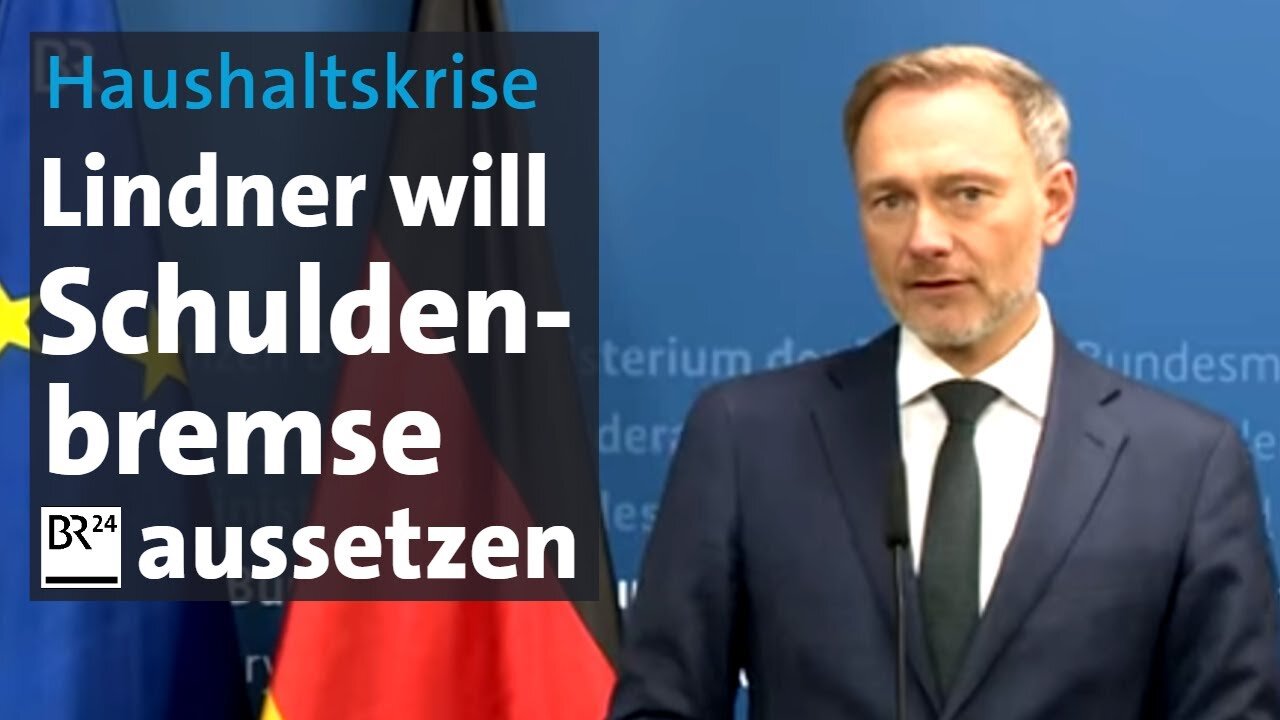Premium Only Content

Haushaltskrise_ Lindner will Schuldenbremse aussetzen _ BR24.
Title: Haushaltskrise and Lindner's Proposal to Suspend Schuldenbremse
Abstract:
This dissertation explores the contemporary economic challenges faced by Germany, particularly in the context of the Haushaltskrise (budget crisis), and analyzes the proposed solution put forth by Christian Lindner to temporarily suspend the Schuldenbremse (debt brake). The Schuldenbremse, implemented in 2009, has been a cornerstone of Germany's fiscal policy, aiming to ensure fiscal discipline and sustainability. However, in the wake of unprecedented economic challenges, Lindner's proposition to suspend the Schuldenbremse has sparked debates on the trade-off between fiscal responsibility and the need for economic stimulus.
Chapter 1: Introduction
The introduction provides an overview of the Haushaltskrise, highlighting the economic difficulties that Germany is currently facing. It introduces Christian Lindner's proposal to suspend the Schuldenbremse temporarily as a response to the crisis, setting the stage for the subsequent analysis.
Chapter 2: The Schuldenbremse
This chapter delves into the origins and principles of the Schuldenbremse. It outlines the rationale behind its implementation and its impact on Germany's fiscal policy over the past decade. The chapter also discusses the advantages and criticisms of the debt brake, emphasizing its role in maintaining fiscal discipline and preventing excessive public debt.
Chapter 3: The Haushaltskrise
This section provides an in-depth analysis of the Haushaltskrise, exploring the economic factors contributing to the crisis. It examines the impact of global economic trends, internal structural issues, and unforeseen events that have led to the need for a reevaluation of Germany's fiscal policy.
Chapter 4: Lindner's Proposal
Christian Lindner's proposal to suspend the Schuldenbremse during the Haushaltskrise is the focal point of this chapter. It examines the specific details of Lindner's plan, the timeframe for suspension, and the intended economic outcomes. The chapter also presents the arguments put forth by Lindner and his supporters, emphasizing the urgency of addressing the economic challenges.
Chapter 5: Criticisms and Alternatives
This section critically evaluates Lindner's proposal by exploring various criticisms and alternative approaches. It considers the potential risks associated with suspending the Schuldenbremse, such as the long-term impact on fiscal discipline and the possibility of creating a precedent for future crises. Alternative strategies for addressing the Haushaltskrise are also discussed.
Chapter 6: Conclusion
The conclusion synthesizes the findings of the dissertation, offering a balanced assessment of Lindner's proposal in the context of the Haushaltskrise. It discusses the broader implications for Germany's fiscal policy and the potential lessons that can be drawn for future economic challenges. The chapter concludes by highlighting the ongoing debate surrounding the balance between fiscal responsibility and the imperative for economic stimulus in times of crisis.
-
 1:08:28
1:08:28
Twins Pod
8 hours agoConservative Latina FIRECRACKER Running For CONGRESS! | Twins Pod - Episode 59 - Valentina Gomez
28.2K5 -
 LIVE
LIVE
Jeff Ahern
1 hour agoFriday Freak out with Jeff Ahern (1pm Pacific)
188 watching -
 2:11:58
2:11:58
The Quartering
4 hours agoTrump's Job Market EXPLODES, Bill Burr Runs, Matt Walsh Triggers , Leftist Attacks My Company
164K82 -
 1:06:15
1:06:15
Sean Unpaved
4 hours agoColorado Set To Host NFL Showcase, Last Final Four Predictions, & Bracket Challenge Update!
43.8K1 -
 1:23:40
1:23:40
Ben Shapiro
4 hours agoEp. 2173 - FALLOUT: Stock Market Drops, Trump Pushes On
66.8K57 -
 58:57
58:57
Crypto Power Hour
9 hours ago $0.48 earnedKnow Your Coins, ‘In Crypto We Trust |EP10
12.6K3 -
 2:06:49
2:06:49
Tim Pool
5 hours agoHas Welfare DESTROYED US Culture & The Family? | The Culture War with Tim Pool
168K173 -
 1:55:37
1:55:37
Steven Crowder
7 hours ago🔴 The Friday Show: Fat Pride is Over, California Sucks, and So Does Springsteen (ft. Vince)
394K269 -
 51:57
51:57
The Rubin Report
6 hours agoAndrew Schulz Is Shocked When Dem Mayor Says What No Democrat Will Admit
75.9K40 -
 57:43
57:43
The Big Mig™
4 hours agoGlobal Finance Forum From Bullion To Borders We Cover It All
42.9K7